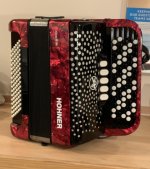Cheshire Chris
Active member
My elderly secondhand Hohner Verdi V 120-base PA has metamorphosed into a new Hohner Nova III C-system 96-bass CBA ?. A lot of money to spend, but I decided that I really do prefer the CBA and it's much smaller and lighter than the PA! The CBA just seems so much more logical in its layout - learn a tune in one key and you can play it in any other key with exactly the same fingering; chords have the same fingering in every key, and so on.
Sounds lovely and I'm really looking forward to starting to play it. My local area goes into much stricter lockdown tomorrow, so the perfect opportunity.

Sounds lovely and I'm really looking forward to starting to play it. My local area goes into much stricter lockdown tomorrow, so the perfect opportunity.

